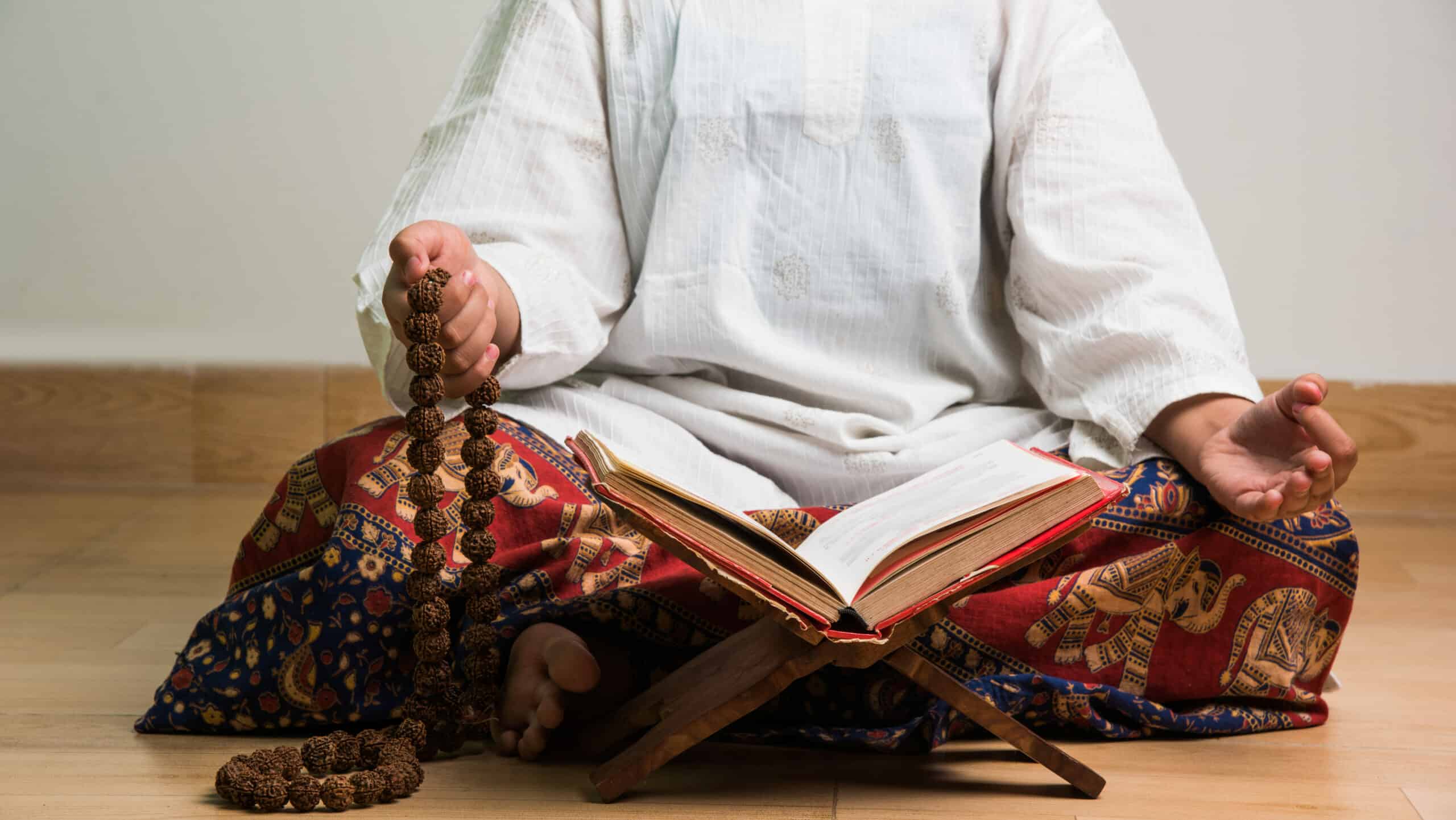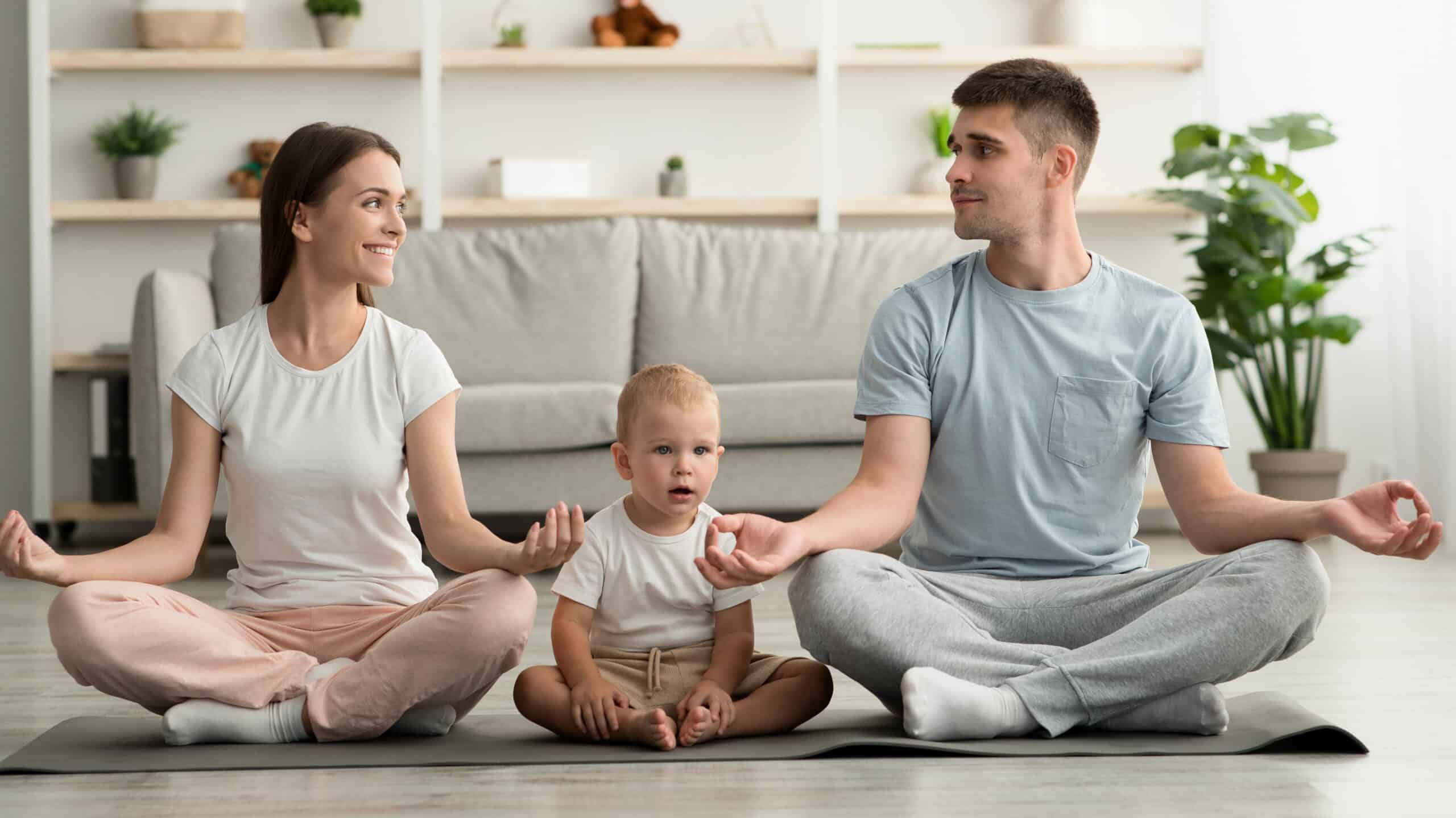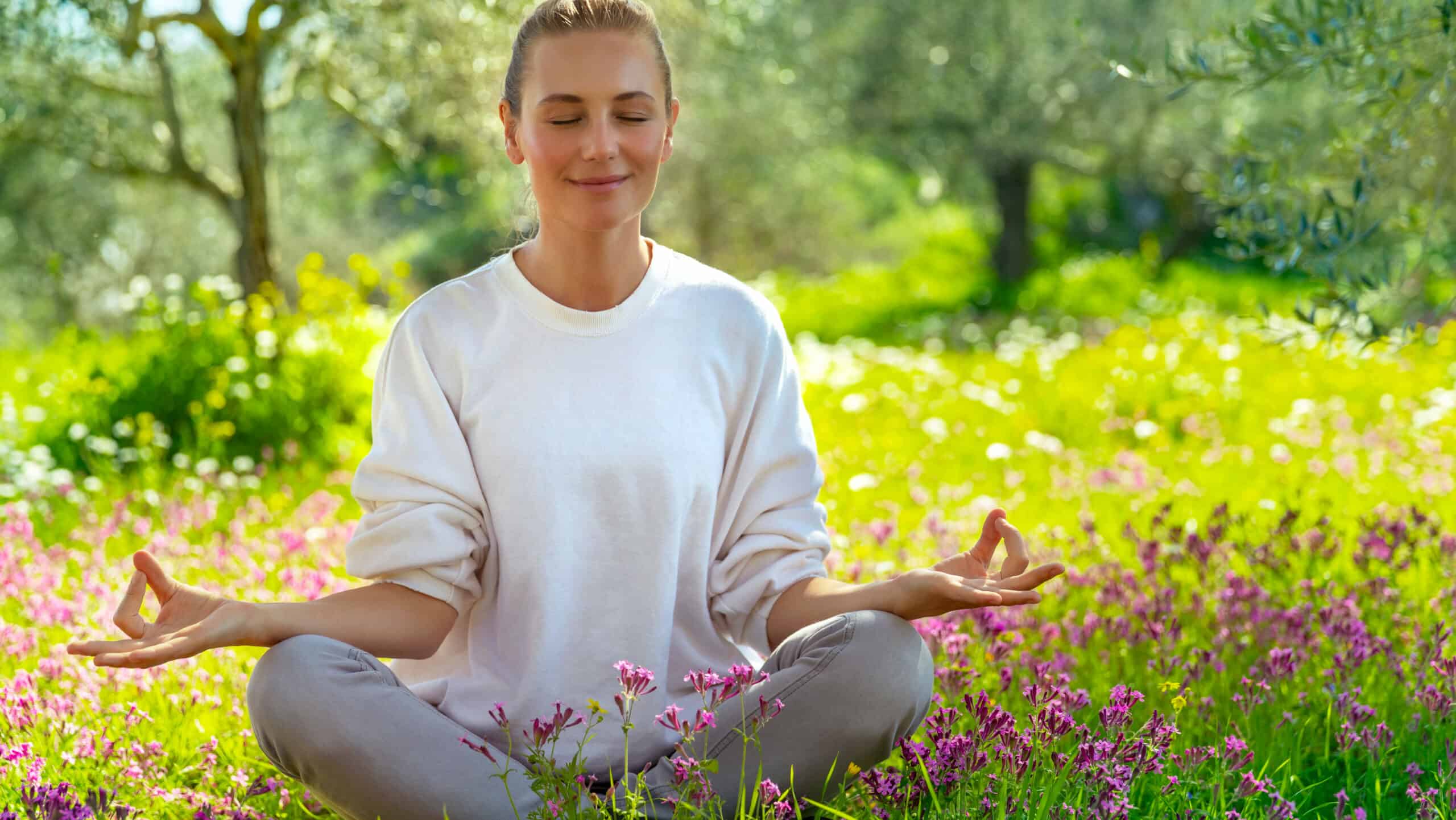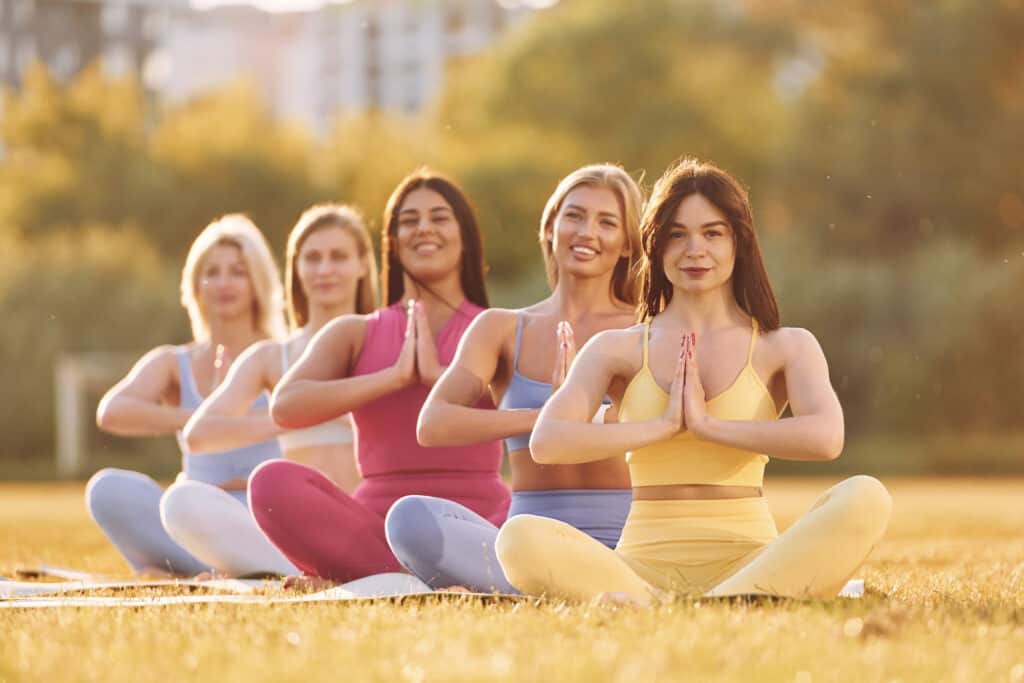With a deep understanding of meditation’s history and many techniques, those wishing to improve their well-being can draw on the wealth of knowledge available. For millennia, meditation has been used to explore inner realms and find peace in a chaotic world.
In this comprehensive guide, we will delve into various aspects of meditation, from its rich history and diverse approaches to the numerous health benefits associated with regular practice. We will also cover popular meditation techniques such as mindfulness-based practices and transcendental meditation, providing comprehensive insights on how to integrate them into your routine.
Furthermore, we will address common challenges faced by practitioners when meditating and offer guidance on overcoming them. Finally, we’ll explore resources available for those who wish to seek further support in their journey towards mastering meditation benefits techniques.
Understanding Meditation

Meditation is a practice that involves clearing your mind using mental and physical techniques. Meditation is a widespread practice with spiritual roots, used by many to boost brain health and bolster well-being. In this section, we will explore the history of meditation and discuss different approaches to help you better understand this ancient practice.
The History of Meditation
Tracing back to the early 1500s BCE, meditation is believed to have originated in India. Over time, various forms have evolved within different religious traditions such as Buddhism, Hinduism, Taoism, Christianity, Judaism, and Islam. Today’s modern mindfulness meditation practices are often rooted in Buddhist teachings but have been adapted for secular use across diverse cultures.
Different Approaches to Meditation
There are numerous approaches to practicing meditation; however, most involve focusing on a specific object or thought while maintaining awareness of one’s breath or body sensations. Here are some common methods:
- Mindfulness: This technique emphasizes paying attention to the present moment without judgment or distraction.
- Concentration: Involves focusing on a single point such as an image or mantra (repeated word) while blocking out other thoughts.
- Loving-kindness (Metta): Aims at cultivating feelings of compassion towards oneself and others through guided visualization exercises.
- Bodyscan/Progressive Relaxation: Focusing sequentially on different parts of the body helps release tension stored within muscles during periods when relaxation might be challenging.
Each approach offers unique benefits, and individuals may find one method more appealing or effective than another. Try out various techniques to identify which one is most effective for you. For a comprehensive guide on various meditation styles, consider exploring this resource.
Meditation, a practice with roots stretching back centuries, can yield numerous mental health advantages when regularly engaged in it. Now, let’s look into the potential advantages of meditation that can be experienced when done regularly.
Benefits of Regular Meditation

Multiple research studies have found that people who meditate regularly have healthier brains, are less likely to show age-related loss of function, and experience numerous other benefits for their mental, emotional, and physical well-being. Let’s explore some of the key advantages that come with consistent meditation practice.
Improved Focus and Concentration
Meditation techniques often involve focusing on a specific object or thought, which can help train your mind to concentrate better in daily life. In fact, functional magnetic resonance imaging (fMRI) studies have shown changes in brain structure among those who practice meditation regularly – particularly in areas related to attention and cognitive processing.
Reduced Stress Levels
Meditation is known for its stress reduction properties as it helps regulate the body’s stress response system by activating relaxation responses through breathing exercises and mindfulness practices. This leads to lower cortisol levels – the hormone responsible for stress – resulting in reduced anxiety and an overall positive mood.
Better Emotional Regulation
- Mindfulness meditation: By practicing mindfulness meditation consistently, you learn how to be present moment-to-moment without judgment or reaction; this awareness allows you to manage emotions more effectively during stressful situations.
- Loving-kindness (Metta) meditation: This type of meditation focuses on cultivating compassion towards oneself and others; it has been linked with increased empathy levels leading to improved relationships both personally & professionally.
Enhanced Self-Awareness
Meditation affords a singular chance for introspection and enhanced cognizance of one’s musings, sentiments, and corporeal perceptions. This heightened self-awareness can lead to better decision-making, improved emotional health, and the ability to recognize unhelpful thought patterns or addictive behaviors before they escalate.
Physical Benefits
In addition to mental health benefits, regular meditation practice has been associated with numerous physical advantages such as reduced chronic pain levels due to its impact on the brain’s pain-processing regions. Furthermore, it can help lower blood pressure by promoting relaxation and reducing stress – factors that contribute significantly towards hypertension.
Regular meditation has been proven to have many beneficial effects on both the mind and body, making it an invaluable tool for improving overall well-being. Let’s examine various meditation approaches presently available for enhancing one’s physical and mental well-being.
Popular Types of Meditation Techniques

There are various types of meditation techniques that cater to different needs or preferences. Some common forms include mindfulness-based practices, transcendental meditation (TM), loving-kindness (Metta) meditation, body scans, or progressive relaxation methods.
Mindfulness-Based Practices
Mindfulness meditation is a practice where you focus your attention on the present moment without judgment. By focusing on the present moment without judgment, mindfulness meditation helps to reduce stress and anxiety by allowing individuals to become more aware of their thoughts and emotions. Mindfulness-based practices often involve focusing on the breath as an anchor for maintaining awareness in the present moment.
Breathing Exercises:
- Diaphragmatic breathing: Involves deep inhalation through the nose followed by slow exhalation through pursed lips.
- Nadi Shodhana Pranayama (Alternate Nostril Breathing): A technique that involves alternating between nostrils while inhaling and exhaling.
- Square breathing: Involves inhaling for four counts, holding for four counts, exhaling for four counts, and then pausing again before repeating the cycle.
Transcendental Meditation (TM)
Transcendental Meditation, also known as TM, is a mantra-based technique that requires practitioners to silently repeat a specific sound or phrase during their sessions. The goal is to achieve a state of relaxed alertness without engaging with any thoughts or distractions arising in one’s mind. Regular practice can lead to reduced stress levels and improved emotional health.
Loving-kindness (Metta) Meditation
Loving-kindness meditation, or Metta, is a practice that involves cultivating feelings of love and compassion for oneself and others. By focusing on sending loving thoughts and good wishes to those in one’s life, Metta meditation encourages the development of positive emotions and improved relationships. Practicing loving-kindness can lead to increased empathy and improved relationships.
Body Scan/Progressive Relaxation
Body scan meditation or progressive relaxation techniques involve focusing attention on different parts of the body while consciously releasing tension from each area. MBSR, such as a stress-reduction program, can incorporate body scan meditation or progressive relaxation techniques to aid individuals in recognizing physical sensations and achieving a more relaxed state while managing chronic pain. They help individuals become more aware of physical sensations within their bodies while promoting relaxation and reducing chronic pain.
Meditating can be tailored to one’s particular needs and inclinations, providing a practicable approach for instilling mindfulness into regular life. Incorporating a meditation practice into one’s lifestyle can be an excellent means of accessing the various advantages it provides.
Incorporating Meditation into Your Daily Life

To maximize the advantages of regular meditation, establishing a consistent routine is key. Creating a consistent routine can help you build the habit more easily while adapting your schedule according to personal preferences or lifestyle demands. In this section, we will discuss how to find the best time for daily practice, choose an appropriate environment, and set realistic goals.
Finding the Best Time for Daily Practice
One of the key factors in making meditation work is consistency. To establish a successful mindfulness meditation routine, identify a specific time that works best for you and commit to practicing at that same time every day. Some people prefer meditating early in the morning before starting their daily activities; others may find evenings or lunch breaks more suitable. Experiment with different times until you discover what feels most comfortable and sustainable.
Choosing an Appropriate Environment
The environment plays a crucial role in enhancing your ability to focus attention during meditation sessions. Find a quiet space where you feel relaxed and free from distractions – this could be indoors or outdoors depending on your preferences. You might also consider creating a dedicated “meditation corner” within your home by adding elements such as cushions, candles, or calming artwork that evokes serenity and encourage relaxation.
- Tips:
- If noise is unavoidable due to living circumstances (e.g., roommates), try using headphones with soft instrumental music or white noise apps like Calm.
- Ensure adequate lighting: natural light during daytime sessions and soft, warm light for evening sessions.
Setting Realistic Goals
When beginning your meditation journey, it’s essential to set achievable goals that promote a positive mood and prevent feelings of frustration or disappointment. Start off with shorter sessions, then increase the length as you become more comfortable and focus on quality rather than quantity. Though lengthier periods of meditation can be beneficial, even a few minutes of mindful awareness can have powerful effects on decreasing stress and boosting mental health.
In addition to setting time-based goals, consider incorporating specific meditation techniques, such as focusing on breathwork or practicing loving-kindness meditation, into your daily routine. These methods can help address particular mental health conditions like anxiety or chronic pain while also enhancing overall well-being.
Uncovering and comprehending your own personal needs can be a gratifying journey when meditation is incorporated into everyday life. Given the potential rewards of meditating, let’s examine some of the common obstacles to it and how they can be overcome.
Overcoming Common Challenges in Meditating
As with any new skill or habit, beginners may face certain challenges when starting out with meditation. Identifying these obstacles early on will enable individuals to seek guidance on how best they could overcome them effectively. In this section, we will discuss some common challenges faced by those who are new to meditation and provide tips for overcoming them.
Dealing with Distractions During Sessions
Distractions can be a major obstacle for those trying to establish a regular meditation practice. External noises, wandering thoughts, and physical discomforts can all make it difficult to maintain focus during your sessions. To minimize distractions:
- Create a quiet space dedicated solely to your practice – free from noise and interruptions.
- Use headphones or earplugs if necessary to block out external sounds.
- Practice breathing exercises before beginning your session to help calm the mind and prepare it for focused attention.
- Acknowledge distracting thoughts as they arise but gently redirect your focus back onto the present moment without judgment or frustration.
Managing Expectations Around Progress
Meditation is not an instant fix; it requires consistent effort over time before its full benefits become apparent. It’s important not to expect immediate results from practicing meditation regularly since this can lead you to feel discouraged or impatient about the progress made so far. Instead:
- Be patient, understanding that change takes place gradually through daily commitment.
- Celebrate small victories such as noticing improvements in concentration levels, reduced stress response, increased self-awareness, etc.
- Remember the ultimate goal is not perfection but rather cultivating a healthy, sustainable meditation practice that supports overall well-being.
Cultivating Patience and Persistence
Developing patience and persistence are essential qualities for successful meditation practitioners. These traits help you stay committed to your practice even when progress seems slow or setbacks occur. To cultivate these qualities:
- Set realistic goals for yourself, such as starting with just a few minutes of daily practice and gradually increasing over time.
- Remind yourself of the advantages to be gained from consistent meditation, like lower levels of stress, more concentrated attention, better control over emotions, and more.
- Learn from experienced meditators, who can offer guidance on how they have overcome similar challenges in their own practices.
- Acknowledge that setbacks are a natural part of any learning process – use them as opportunities to grow stronger in your resolve towards achieving success within this journey.
Sticking with it and having patience are essential for surmounting the regular obstacles of meditation, but with assistance and direction, can result in a gratifying experience. Seeking out resources such as books on meditation techniques, online courses, apps, or local meditation groups is an effective way to gain more insight into this practice.
Seeking Guidance and Support for Meditation

Learning about meditation, its techniques, and benefits can be done through various resources such as books, online courses, or attending workshops. Additionally, seeking help from experienced practitioners or joining local meditation groups can provide valuable support in your journey.
Books on Meditation Techniques
If you prefer learning through reading, there are numerous books on meditation techniques available to guide you in your practice. Some popular titles include:
- The Miracle of Mindfulness: An Introduction to the Practice of Meditation by Thich Nhat Hanh
- Mindfulness in Plain English by Bhante Henepola Gunaratana
- The Power of Now: A Guide to Spiritual Enlightenment by Eckhart Tolle
- Zen Mind, Beginner’s Mind: Informal Talks on Zen Meditation and Practice by Shunryu Suzuki
Online Courses and Apps
In this digital era, it is increasingly easy to acquire new abilities via online platforms. There are several websites that offer guided meditation sessions along with helpful tips for beginners. Some popular options include:
- Headspace – a mobile app offering guided meditations tailored for different needs.
- Calm – an app providing relaxation exercises alongside sleep stories and music tracks designed specifically for stress reduction.
- Udemy – an online learning platform featuring various meditation courses, from beginner to advanced levels.
- Insight Timer – a free app offering thousands of guided meditations and talks led by experienced teachers worldwide.
Local Meditation Groups
Joining local meditation groups can be an excellent way to receive guidance from experienced practitioners while connecting with like-minded individuals. These groups often hold regular meetings or workshops where you can practice meditation in a supportive environment. To find nearby meditation groups:
- Search for listings on websites such as Meetup, which allows users to create and join interest-based communities.
- Contact local yoga studios or wellness centers, as they may offer group meditation sessions or have information about nearby gatherings.
- Explore the offerings at spiritual retreats or religious institutions that might host regular mindfulness practices open to the public.
Frequently Asked Questions Meditation Benefits Techniques
What are the techniques and benefits of meditation?
Meditation techniques vary, but common ones include mindfulness-based practices, transcendental meditation (TM), loving-kindness (metta) meditation, and body scan/progressive relaxation. Benefits of regular meditation include improved focus and concentration, reduced stress levels, enhanced self-awareness, better emotional regulation, and even improved sleep.
Is there research showing the benefits of meditation?
Yes. Numerous studies have demonstrated various mental health benefits associated with consistent practice. For example, research published in JAMA Internal Medicine found that mindfulness-based interventions can help reduce anxiety symptoms.
What is the powerful technique of meditation?
The most “powerful” technique varies for each individual; however, many people find Transcendental Meditation (TM) to be particularly effective. TM involves silently repeating a mantra to achieve deep relaxation and increased self-awareness while providing numerous other benefits.
What are the 7 benefits of meditation?
Meditation offers multiple advantages, including:
- Improved focus and concentration.
- Reduced stress levels.
- Better emotional regulation.
- Increase in self-awareness.
- Promotion of overall well-being.
- Enhanced creativity.
- Improved sleep quality.
Conclusion
Overall, understanding and practicing meditation benefits techniques can have a significant impact on one’s mental and physical well-being. By incorporating different types of meditation into daily life, individuals can improve focus and concentration, reduce stress levels, enhance self-awareness, and regulate emotions better.























